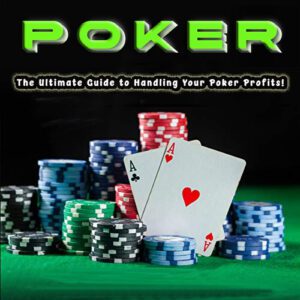
Managing those poker profits effectively is crucial for sustaining success in the long run. Poker, undoubtedly, is a game of skill, strategy, and nerve-wracking excitement. Whether you’re a seasoned pro or a casual player, the thrill of winning and the satisfaction of cashing out your earnings are unparalleled.
Setting Financial Goals
In the world of poker, having clear financial goals is paramount. It’s not just about winning; it’s about knowing what you want to achieve with your winnings. Whether it’s paying off debts, saving for a vacation, or building your bankroll, defining your objectives helps guide your decisions and keeps you focused.
Effective Bankroll Management
Effective bankroll management is one of the key components of successful poker profit management. In the game of poker, your bankroll is your lifeline.
It is important to manage it well to guarantee that you can withstand the ups and downs of the volatile poker scene. It entails establishing boundaries, honoring them, and never taking on more risk than you can comfortably lose.
Cash In Strategies
When it comes to cashing in your poker profits, you have several options at your disposal. From traditional bank transfers to e-wallets and cryptocurrency, each method has its pros and cons. Choosing the right cash in strategy depends on factors such as convenience, speed, and security.
Cash Out Strategies
Similarly, cashing out your poker earnings requires careful consideration. Whether you prefer cashing out in increments or all at once, it’s essential to weigh the risks and benefits of each approach. Factors like withdrawal fees, processing times, and exchange rates can impact your decision.
Tax Implications
Winnings at poker might be exciting, but they often have tax implications. Complying with the law and avoiding unpleasant surprises during tax season require that you have a thorough understanding of the tax implications of your revenues. A tax expert’s advice can guide you through this tricky part of handling your winnings from poker.
Risk Management
In poker, as in any form of investing, risk management is key. Knowing how to minimize your exposure to risk while maximizing your potential profits is a skill that separates the amateurs from the pros. This involves strategic decision-making, disciplined play, and knowing when to fold’em.
Investing Poker Profits
Once you’ve amassed a significant amount of poker earnings, you may consider investing them to further grow your wealth. Whether it’s stocks, real estate, or other investment vehicles, the key is to make informed decisions based on your risk tolerance, financial goals, and market conditions.
Handling Losing Streaks
No poker player is immune to losing streaks. How you handle these inevitable downturns can make or break your success in the game. It’s essential to maintain perspective, stay disciplined, and avoid chasing losses. Remember, tomorrow is another hand.
Mindset and Discipline
The mental aspect of poker cannot be overstated. Maintaining a positive mindset and discipline in the face of adversity is what separates the winners from the losers. Developing mental resilience, emotional control, and a healthy attitude towards variance are essential for long-term success.
Avoiding Scams and Fraud
Unfortunately, the world of poker is not without its share of scams and frauds. From shady online operators to dishonest players, there are many pitfalls to watch out for. Stay vigilant, protect your personal information, and always play on reputable platforms to minimize the risk of falling victim to fraud.
Continuous Learning
Poker is a game of constant evolution. To stay ahead of the curve, it’s essential to continually seek out new knowledge and refine your skills. Whether it’s reading books, watching videos, or analyzing hand histories, there’s always something to learn in poker.
Building a Support Network
Having a supportive poker community can be invaluable on your journey to success. Surround yourself with like-minded individuals who share your passion for the game, exchange ideas, and support each other through the highs and lows. Together, you’ll be stronger and more resilient.
Staying Legal and Ethical
Last but not least, it’s crucial to stay on the right side of the law and adhere to ethical principles in your poker endeavors. Respect the rules of the game, play fair, and treat your fellow players with respect. In the end, integrity is worth more than any pot.
Conclusion
Managing your poker profits effectively requires a combination of skill, discipline, and foresight. By setting clear financial goals, practicing effective bankroll management, and making informed decisions about cashing in and cashing out, you can maximize your chances of long-term success in the game.
FAQs (Frequently Asked Questions)
Is poker a reliable source of income?
While some players have been able to make a living from poker, it’s essential to recognize the inherent risks and volatility involved.
How much should I set aside for taxes on my poker winnings?
Tax obligations vary depending on your jurisdiction and the amount of your winnings. It’s advisable to consult with a tax professional for personalized advice.
What is the best way to recover from a losing streak in poker?
The key to bouncing back from a losing streak is to maintain discipline, analyze your play objectively, and focus on making sound decisions in future hands.
Are there any legitimate investment opportunities for poker profits?
Yes, there are various investment options available, including stocks, real estate, and mutual funds. It’s essential to do your research and seek professional advice before investing.
How can I protect myself from online poker scams?
To avoid falling victim to online scams, stick to reputable poker sites, use secure payment methods, and be cautious of any offers that seem too good to be true.
